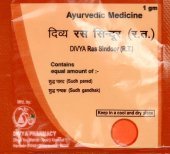Shudh, Śudh: 10 definitions
Introduction:
Shudh means something in Hinduism, Sanskrit, Hindi. If you want to know the exact meaning, history, etymology or English translation of this term then check out the descriptions on this page. Add your comment or reference to a book if you want to contribute to this summary article.
The Sanskrit term Śudh can be transliterated into English as Sudh or Shudh, using the IAST transliteration scheme (?).
In Hinduism
Kavya (poetry)
Source: OpenEdition books: Vividhatīrthakalpaḥ (Kāvya)Śudh (शुध्) in Sanskrit means “to sift to find”, as is mentioned in the Vividhatīrthakalpa by Jinaprabhasūri (13th century A.D.): an ancient text devoted to various Jaina holy places (tīrthas).—Cf. śuddhy-artham [(34) 63.10], § 2; śuddhi KR [(34) 62.13], § 2; śuddhi labh “find trace of” [(34) 62.24], § 2.

Kavya (काव्य, kavya) refers to Sanskrit poetry, a popular ancient Indian tradition of literature. There have been many Sanskrit poets over the ages, hailing from ancient India and beyond. This topic includes mahakavya, or ‘epic poetry’ and natya, or ‘dramatic poetry’.
Languages of India and abroad
Sanskrit dictionary
Source: DDSA: The practical Sanskrit-English dictionaryŚudh (शुध्).—4 P. (śudhyati, śuddha)
1) To become pure or purified; (fig. also); मृत्तोयैः शुध्यते शोध्यं नदी वेगेन शुध्यति । अद्भिर्गात्राणि शुध्यन्ति मनः सत्येन शुध्यति (mṛttoyaiḥ śudhyate śodhyaṃ nadī vegena śudhyati | adbhirgātrāṇi śudhyanti manaḥ satyena śudhyati) || Manusmṛti 5.18-9.
2) To be auspicious, favourable, or eligible; तिथिरेव तावन्न शुध्यति (tithireva tāvanna śudhyati) Mu. 5.
3) To be made clear, have the doubts removed; न शुध्यति मेऽन्तरात्मा (na śudhyati me'ntarātmā) Mṛcchakaṭika 8.
4) To be defrayed or cleared; व्ययः शुध्यति (vyayaḥ śudhyati) Pañcatantra (Bombay) 5. -Caus. (śodhayati-te)
1) To purify, cleanse, wash off.
2) To clear, pay off (as a debt).
3) To refine, filter.
4) To correct.
5) To acquit.
6) To examine, investigate, inquire into. -With परि, वि, सम् (pari, vi, sam) to be purified; रघुपतिरपि जातवेदोविशुद्धां प्रगृह्य प्रियाम् (raghupatirapi jātavedoviśuddhāṃ pragṛhya priyām) R.12. 14; Manusmṛti 5.64.
Source: Cologne Digital Sanskrit Dictionaries: Shabda-Sagara Sanskrit-English DictionaryŚudh (शुध्).—[(o, ḷ)ośudhḷ] r. 4th cl. (śudhyati) 1. To be or become pure or purified. 2. To be made clear, to have doubts removed. With pari, vi, or sam, To be purified.
Source: Cologne Digital Sanskrit Dictionaries: Benfey Sanskrit-English DictionaryŚudh (शुध्).— (probably for original śvadh), i. 4, [Parasmaipada.] 1. To be purified, [Mānavadharmaśāstra] 3, 132; [Pañcatantra] i. [distich] 307. 2. To become pure, [Mānavadharmaśāstra] 5, 63. Ptcple. of the pf. pass. śuddha. 1. Pure, [Hitopadeśa] [distich] 78, M. M. 2. White. 3. Faultless, genuine, [Mālavikāgnimitra, (ed. Tullberg.)] [distich] 30. 4. Innocent. 5. Acquitted. 6. Authorised. 7. Alone, [Meghadūta, (ed. Gildemeister.)] 88; only, mere, simple. 8. Whetted. n. 1. Pure spirit. 2. Rock-salt. Comp. A-, adj. impure, wicked, [Pañcatantra] i. [distich] 335. Ati-, very pure, [Hitopadeśa] i. [distich] 198, M. M. Ptcple. of the pf. act. śuddhavant, f. vatī; nom. pl. vatjas, [Mānavadharmaśāstra] 11, 249, designates a holy text beginning śuddhavatyas. [Causal.] 1. To purify, [Mānavadharmaśāstra] 9, 282. 2. To explain, [Vedāntasāra, (in my Chrestomathy.)] in
— With the prep. pari pari, [Causal.] 1. To clean, to secure, [Rāmāyaṇa] 2, 31, 25. 2. To solve, to explain, [Gītagovinda. ed. Lassen.] 12, 28.
— With vi vi, To be purified, [Mānavadharmaśāstra] 5, 66. viśuddha, 1. Pure, [Pañcatantra] pr. [distich] 9. 2. Faultless, [Mālavikāgnimitra, (ed. Tullberg.)] 21, 8; [Hitopadeśa] pr. [distich] 23, M. M. (vaṃśa-, regarding, the bambu, of which it is made, viz. a bow). 3. White, [Ṛtusaṃhāra] 6, 34. 4. Corrected. 5. Pious, virtuous. 6. Humble, modest. 7. Settled, [Mānavadharmaśāstra] 8, 201. Comp. A-, adj. wicked, [Rājataraṅgiṇī] 5, 315. [Causal.] To purify, Mahābhārata 3, 15979.
— With sam sam, saṃśvddha, 1. Purified, expiated, [Bhagavadgītā, (ed. Schlegel.)] 6, 45. 2. Clean. 3. Refined. 4. Acquitted (as a debt, or of a crime). [Causal.] 1. To purify, [Rājataraṅgiṇī] 5, 89. 2. To secure, [Mānavadharmaśāstra] 7, 185. 3. To cover (as expenses), Mahābhārata 2, 204. 4. To examine, [Mānavadharmaśāstra] 7, 219.
— Cf. śundh; probably [Latin] castus, [Old High German.] haitar, screnus.
Source: Cologne Digital Sanskrit Dictionaries: Cappeller Sanskrit-English DictionaryŚudh (शुध्).—śundh, [participle] śuddha (q.v.), śundhati, [participle] śuddha (q.v.), śundhate purify, [Middle] mostly [intransitive] or refl.; śudhyati (te) become pure or clear, be justified or excused. [Causative] śodhayati purify (also śundhayati); mend, correct; wash or clear off, remove (what is impure or noxious); pay back, restore; examine, try; acquit, justify; make clear, explain.
Source: Cologne Digital Sanskrit Dictionaries: Monier-Williams Sanskrit-English DictionaryŚudh (शुध्):—or śundh [class] 1. [Ātmanepada] [Parasmaipada] ([Dhātupāṭha iii, 37]) śundhati, te ([imperative] śunddhi, [Āśvalāyana-gṛhya-sūtra]; [perfect tense] śuśundha [Aorist] aśundhīt [future] śundhitā, śundhiṣyati [grammar]),
—to purify ([Ātmanepada] ‘one’s self’, become or be pure), [Ṛg-veda; Vājasaneyi-saṃhitā; Taittirīya-brāhmaṇa; Gṛhya-sūtra and śrauta-sūtra];—[class] 4. [Ātmanepada] [Parasmaipada] ([Dhātupāṭha xxvi, 82]) śudhyati (mc. also te; [perfect tense] śuśodha [Aorist] aśudhat [future] śoddhā, śotsyati, [infinitive mood] śoddhum [grammar]),
—to be cleared or cleansed or purified, become pure ([especially] in a ceremonial sense), [Vājasaneyi-saṃhitā; Manu-smṛti; Mahābhārata] etc.;
—to become clear or free from doubts, [Rāmāyaṇa; Mṛcchakaṭikā];
—to be cleared or excused from blame, to be excusable, [Kathāsaritsāgara] :—[Passive voice] śudhyate ([Aorist] aśodhi) [grammar]:
—[Causal] śundhayati, to clear, purify, [Vājasaneyi-saṃhitā];
— śodhayati ([Aorist] aśūśudhat), to purify ([especially] in a ceremonial sense), [Taittirīya-saṃhitā] etc. etc.;
—to correct, improve, [Yājñavalkya [Scholiast or Commentator]];
—to remove (impurity or anything noxious), [Manu-smṛti; Mahābhārata] etc.;
—to clear off, pay (debts), [Rājataraṅgiṇī; Manvarthamuktāvalī, kullūka bhaṭṭa’s Commentary on manu-smṛti];
—to acquit, exculpate, justify, [Manu-smṛti; Kāmandakīya-nītisāra];
—to put to test, [Kathāsaritsāgara];
—to try, examine, [Pañcatantra; Yājñavalkya [Scholiast or Commentator]];
—to make clear, explain, [Vedāntasāra; Madhusūdana];
—to subtract, [Gaṇitādhyāya] :—[Desiderative] śuśutsati, [Nidāna-sūtra] :—[Intensive] śośudhyate, śośoddhi [grammar]
Source: Cologne Digital Sanskrit Dictionaries: Yates Sanskrit-English DictionaryŚudh (शुध्):—(ya) śudhyati 4. a. To be or become pure.
Source: DDSA: Paia-sadda-mahannavo; a comprehensive Prakrit Hindi dictionary (S)Śudh (शुध्) in the Sanskrit language is related to the Prakrit word: Sujjha.
[Sanskrit to German]
Sanskrit, also spelled संस्कृतम् (saṃskṛtam), is an ancient language of India commonly seen as the grandmother of the Indo-European language family (even English!). Closely allied with Prakrit and Pali, Sanskrit is more exhaustive in both grammar and terms and has the most extensive collection of literature in the world, greatly surpassing its sister-languages Greek and Latin.
Hindi dictionary
Source: DDSA: A practical Hindi-English dictionarySudh in Hindi refers in English to:—(nf) memory; consciousness, senses; -[budha] memory; consciousness, senses; •[khona/0na rahana] see —[na rahana; -dilana] to remind; —[na rahana] to forget; to lose or be out of senses; —[bisarana] to forget; to lose or be out of senses; —[lena] to remember; to enquire after..—sudh (सुध) is alternatively transliterated as Sudha.
...
See also (Relevant definitions)
Starts with: Shutran.
Ends with: Abhiprashudh, Akshudh, Kshudh, Parishudh, Pravishudh, Prikshudh, Samshudh, Sashudh, Vikshudh, Vishudh.
Full-text (+67): Shundh, Vishodhin, Parisodhana, Visodhana, Parisuddhi, Parisujjhati, Samshodhana, Samshuddhi, Sujjhati, Prashuddhi, Shuddhi, Vishuddhavamshya, Visodhita, Sodhaka, Vishuddha, Visodheti, Vishodhya, Sodhita, Parisodheti, Vishodhaniya.
Relevant text
Search found 2 books and stories containing Shudh, Śudh, Sudh; (plurals include: Shudhs, Śudhs, Sudhs). You can also click to the full overview containing English textual excerpts. Below are direct links for the most relevant articles:
Trishashti Shalaka Purusha Caritra (by Helen M. Johnson)
Appendix 1.6: New and rare words < [Appendices]
Preceptors of Advaita (by T. M. P. Mahadevan)
Related products
(+5 more products available)





